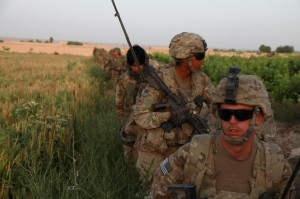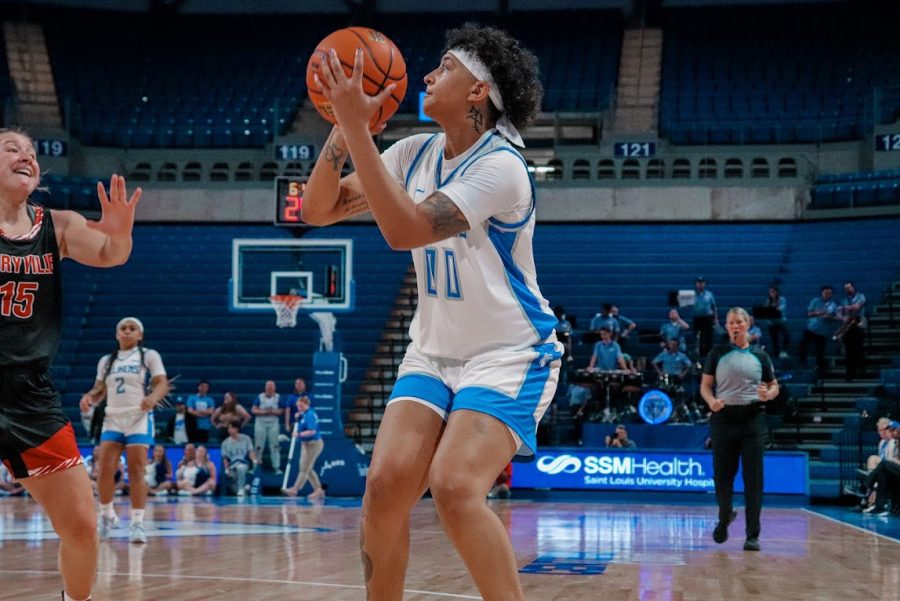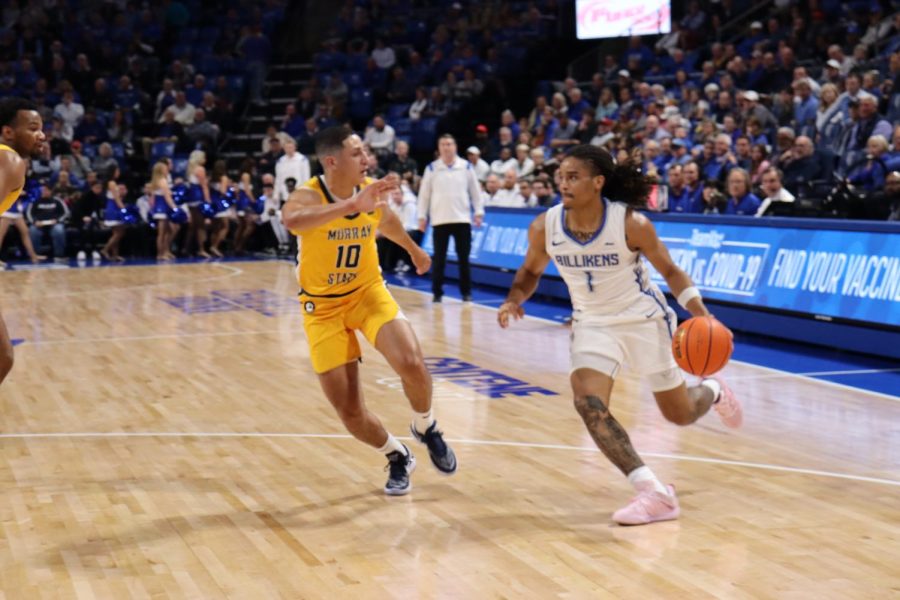While analysts raved about Saint Louis University’s 56-46 triumph over Richmond Saturday evening, the Billiken players were hearing things from a new perspective from a special group of young men.
“Three guys who used to play at West Point came and talked about how much they enjoyed the team,” interim coach Jim Crews said.
Crews, who coached at Army from 2002-09, noted that there was one West Point alumnus in particular that he wanted his team to meet.
“One of them was deployed in Afghanistan and had an accident while he was over there,” he explained. “I had talked to the team about that particularly because of his attitude and how he approached everything, especially such a tragic situation.”
That former player was 1st Lt. Eric “Zast” Zastoupil.
Last August, during a raid to eliminate a group of known targets located in a village in Kandahar, Afghanistan, Zastoupil took a small step off the cleared path and inadvertently triggered an improvised explosive device (IED) that left him completely detached from the bottom half of his left leg.
“It happened, he’s lying there [and] he literally sees his foot in its boot,” Crews explained. “Then a guy under his command comes running over and calls him Zast or Eric. [Zastoupil’s] half unconscious, his foot’s in a boot off his leg, and he looks at the guy and says, ‘You’re not calling me sir?’ and he’s smiling at the kid, showing a great sense of humor in a really tough situation.”
Despite undergoing 12 or 13 surgeries (he admitted that he has lost count) and having endured a lengthy rehab process that also involved learning how to use a prosthetic leg, Zastoupil remained positive, determined to make a full recovery.
In his impromptu speech to the players, he emphasized the importance of staying the course in life and praised the team for its commitment through the year.
“Coach kind of just sprang it on us that we were supposed to say something when he brought us in,” Zastoupil said. “I talked about…how familiar I am with perseverance. I told them I see a lot of fight in them and that they’re doing the right things. They’re a lot of fun to watch.”
“To me, it was just kind of inspirational,” junior Jake Barnett said. “He’s not just sitting back and saying woe is me. He’s going out and living his life. I really respected that about him.”
Two other recent West Point graduates, 1st Lt. Cleveland Richard and 2nd Lt. Julian Simmons, also met with the players in the locker room following the Richmond game.
Richard, who graduated with Zastoupil in 2010, earned a spot on the U.S. All-Armed Forces team after he averaged 16.3 points and 6.4 rebounds in the 2012 Armed Forces Men’s Basketball Championships. Upon graduation, he was assigned to attend the Army Logistics University and later received party orders to remain at Fort Lee with Charlie Company.
Simmons, the youngest of the three, graduated from West Point in 2012 with a degree in Economics and is awaiting deployment with the Quartermaster Branch of the U.S. Army.
“It’s fun, that they still follow my guys, know their names, and what they do,” Crews said proudly. “We have one guy, he was a great defender at Army, so he’s a big Jordair (Jett) fan.”
The connection Richard, Simmons and Zastoupil have forged with their former head coach is not unique. In fact, he has stayed in touch with most of his former players, many of whom have become avid Billiken fans.
“I get updates for every game’s score and usually go online to read or watch postgame interviews. There is a network of former Army players that all share pictures, articles, and videos about Coach and the team.” Zastoupil said before adding, “I lived in Sydney when I was a kid, so naturally I pull for [Cody] Ellis.”
“Clearly, you can tell that he cares about more than just basketball,” Barnett, one of Crews’ current players, said. “He cares about the person.”
“Appreciation and gratitude are two of the most important things to have in life,” Crews explained. “Anytime we can give an example to our players, and ourselves as coaches, it’s a good thing.”
On Aug. 22, just two days before it was to be announced that Crews would be taking over for the late-Rick Majerus as interim head coach, another example of the importance of appreciating life presented itself.

“Right before a meeting, I got a phone call and heard about Eric,” he recalled. “The meeting was about an hour long, and within three minutes [of it ending], the phone rings again. And I’m told one of his teammates, who was in the military, was playing basketball—which is kind of one of the most bizarre things of all—[and] dropped dead of a heart attack.”
The teammate was Richard’s longtime roommate, 1st Lt. Tyrell Thompson. The cause of death: heart failure.
“So, within two hours, one’s getting blown up in Afghanistan and one’s dying on the basketball court in Virginia,” Crews said after a brief pause. “What’s really weird about [Thompson’s death] is those guys get the most thorough physicals you’ve ever seen…and he played basketball for us for four years.”
The 23-year-old, who graduated from the Military Academy in 2010, was set to marry his high school sweetheart in May, but a heart attack during a pickup game at Fort Lee, the base he was stationed at, cut his life short.
“He had a girlfriend all through high school and college, and now she’s a widow at 23,” Crews said softly. “Life is fragile.”
While Thompson’s death was the result of an undiagnosed health condition and not combat, the commitment made by he, and the thousands of others enrolled at West Point, is often overlooked.
“It’s very surreal to think those guys are around my age and they’re dedicating their lives to make sure we have freedoms,” Barnett said. “I was just awestruck because I don’t know if I could do what they do. I think it’s really respectable, really honorable what they do for us, for the country.”
“It’s very important to see people in different situations, in tougher situations, so that we understand what other people are going through,” Crews explained. “It gives you a better appreciation and gratitude for what we have.”
Appreciation for the world outside of college basketball is a value the Billikens’ interim head coach has had since he joined the coaching ranks as an assistant at Indiana University in 1977.

“Basketball—it’s just a game,” Mitchell said. “It’s not just about basketball for him. He always tells stories about guys he used to coach at Army, stressing to not take things for granted.”
“I remember just how much passion he was telling [Zastoupil’s] story with and how connected you felt to that guy because Coach Crews was very adamant about telling his story and how he still talks to him and how he still talks to his players, because that’s really what matters at the end of the day,” Barnett said.
Zastoupil, who was deployed to Panjwai District of Kandahar in March 2012, initially served as the battalion communications officer, but was moved into a Platoon Leader position a month later. Placed in command of 40 enlisted infantry soldiers, he drew heavily from his experience at West Point as he worked to connect with his platoon.
”[Crews] sincerely is concerned about the development of each player as a human being just as much as a basketball player,” he explained. “Each of us turns around and lives these qualities everyday. I used a lot of the same lessons in everyday conversation with my soldiers in Afghanistan. It shows them the level of care you have for them and creates a level of loyalty and trust between team members that cannot be found anywhere else.”
While his on the court successes are impressive, it is Crews’ commitment to his players’ growth and development as men that resonates most with them.
“I think it’s a true testament to his character,” Barnett said. “It’s really easy in our industry, in college basketball, sports in general, to simply look at relationships as a means to your success, looking at players as a way for you to bump up in status or job, but I don’t think that’s Coach Crews at all… He does take that extra time to talk to his players, to keep in touch with them, to help them when they’re done… I think he’s one of a kind in that way.”















